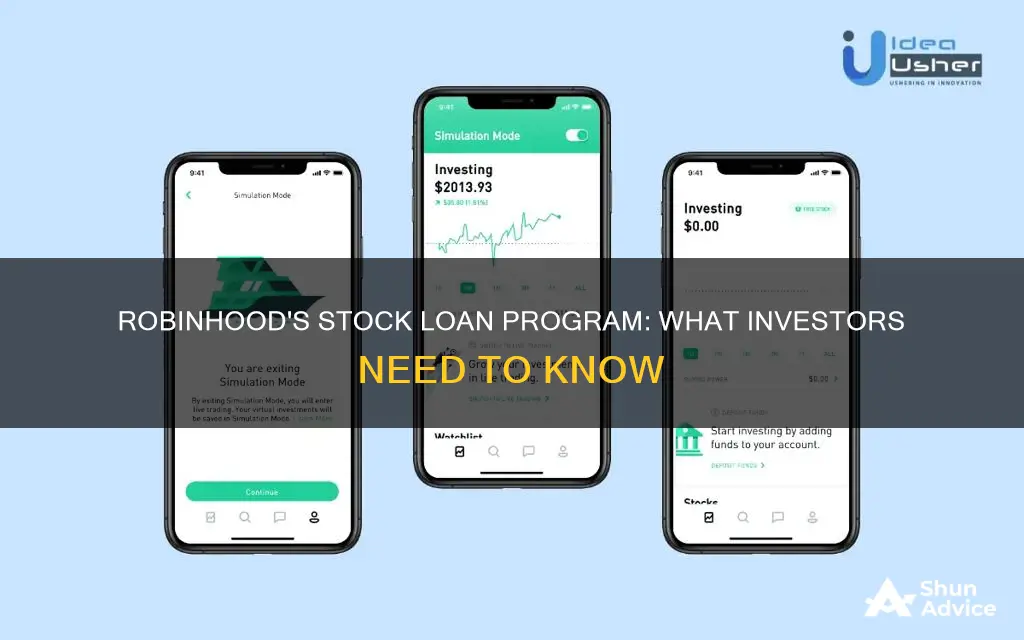
Robinhood is an online trading platform that gained popularity during the meme-stock trading surge. In 2022, the company announced a new stock lending program, allowing customers to lend their stocks to other market participants for a fee. This program was introduced to diversify Robinhood's income streams and boost user growth. While stock lending can provide additional income, there are risks involved, including the possibility of default by the borrower, liquidity issues, and market risks. Robinhood attempts to mitigate these risks by holding cash collateral equal to 100% or more of the loaned stock's value at a third-party bank. However, stock lenders may lose certain rights, such as shareholder voting rights and the ability to collect dividends directly.
| Characteristics | Values |
|---|---|
| What is stock lending? | Financial institutions and other market participants borrow stocks to facilitate trade settlements and sell stocks short. |
| Who can participate in stock lending? | Customers who own shares of companies. |
| What are the benefits of stock lending? | Customers can earn a percentage of the fees. |
| What are the risks of stock lending? | Default risk, liquidity risk, and market risk. |
| What happens if the borrower defaults? | Robinhood Securities could fail to return the securities it has borrowed, and you will not be able to trade such securities as usual. |
| Are there any tax implications? | Dividend payments received in the form of cash are taxed as ordinary income, which is typically at a higher rate than qualified dividends. |
| Can I disable stock lending? | Yes, you can disable stock lending in your account settings. |
| What happens if I disable stock lending? | Any outstanding loans will be terminated, and your stocks will no longer be loaned out. You will also regain shareholder voting rights. |
| Are loaned stocks insured? | No, loaned stocks are not covered by SIPC insurance. However, Robinhood uses cash collateral to protect loaned stocks. |
What You'll Learn

Dividend payments
Robinhood will attempt to return your shares before the dividend record date to mitigate the impact of these cash-in-lieu payments. If you have Dividend Reinvestment (DRIP) enabled, any cash received will automatically be reinvested, whether it is from an actual dividend or a manufactured dividend. Dividends for foreign stocks can take additional time to process, and you will likely receive payment two to three business days after the official payment date.
Prequalification: A Loan Guarantee or Just a First Step?
You may want to see also

Capital gains
Robinhood is an online trading platform that allows investors to lend their stocks to short sellers. This is known as a stock lending program, and it involves investors loaning shares of companies they own to other market participants while collecting a percentage of the fees. While Robinhood does facilitate stock lending, it does not loan stocks.
Now, onto capital gains.
Types of Capital Gains
There are two types of capital gains: short-term and long-term. Short-term capital gains refer to profits made from assets held for one year or less, while long-term capital gains refer to profits made from assets held for more than a year. Short-term capital gains are taxed as ordinary income, whereas long-term capital gains are taxed as investment income and have their own lower tax rates.
Reporting Capital Gains
Tax Implications of Stock Lending
When participating in a stock lending program, investors may lose certain rights, such as shareholder voting rights and the right to collect dividends. While dividends are typically returned for dividend record dates, if this does not happen, investors may receive a "payment in lieu," also known as a manufactured dividend. These manufactured dividends are taxed at a higher rate than qualified dividends.
Additionally, it is important to consider the potential tax implications if Robinhood defaults on its obligations and is unable to return the loaned securities. In such cases, investors may not be able to rely on SIPC insurance, and their ability to trade securities may be impacted.
Prosper Loans: Non-Citizens and Permanent Residents Eligibility
You may want to see also

Default risk
Robinhood has addressed this default risk by providing cash collateral for securities loans. This collateral is held at a third-party bank and is intended to protect the lender in the event that Robinhood fails to return the loaned securities. The company has stated that the collateral may be the only source of satisfaction of its obligations if it is unable to return the loaned securities. However, it is important to note that the collateral held on behalf of the lender may not always equal or exceed the value of the loaned securities.
While the default risk is mitigated by the cash collateral, there are other risks associated with the stock lending program. One such risk is the loss of shareholder voting rights during the loan period. Lenders may also lose the right to collect dividends, instead receiving cash payments that may be taxed differently and at a higher rate. Additionally, the Securities Investor Protection Act may not provide protection for loaned securities.
It is worth noting that default risk in stock lending is rare, and collateral is typically set aside to cover the value of the securities borrowed. However, users should carefully consider the risks and consult with a financial professional before participating in the stock lending program.
Can You Borrow from Your 401(k) Plan?
You may want to see also

Liquidity risk
Robinhood allows investors to lend their stocks to short sellers. This is done through the Stock Lending Program, where customers can lend shares of companies they own to other market participants while collecting a percentage of the fees. Whole shares of fully paid securities, such as stocks, ETFs, and ADRs, are eligible to be loaned out.
The company's monthly active users declined to 15.9 million in the first quarter of 2022, down from 17.7 million the previous year. Robinhood's average revenue per user also decreased to $53, down from $137 a year earlier. The company introduced an array of new products, including expanded trading hours and crypto wallets, to diversify its income and boost user growth.
In terms of the Stock Lending Program, there is a risk that Robinhood Securities could default on its obligations and fail to return the loaned securities. This risk is mitigated by holding cash collateral at a third-party bank to protect the value of the loaned stocks. While Robinhood is a member of the Securities Investor Protection Corp. (SIPC), the Stock Lending Program is not insured by SIPC. This means that investors will have to rely on Robinhood if anything goes wrong.
American University in London: Private Loans for Richmond Students
You may want to see also

Market risk
Robinhood's stock lending program allows customers to lend their stocks to other market participants and collect a fee. While this can be a source of income, there are several risks involved, including market risk.
Additionally, there is a risk that the borrower of your shares could default on their obligation to return them. While this is a rare event, it is possible. If the borrower defaults, you may have to wait for Robinhood to replace your shares, which could take some time. During this period, you may be unable to sell your shares immediately, potentially causing you to miss out on favourable selling opportunities.
Furthermore, there is a chance that short sellers, who borrow stocks with the expectation of profiting from a price drop, could affect the value of your holdings. Short sellers do not directly drive stock prices down, but their actions and market sentiment can influence price movements. If you are concerned about the potential impact of short sellers on your investments, you may want to disable stock lending or refrain from participating in Robinhood's stock lending program.
It is important to note that no investment is entirely risk-free, and the suitability of stock lending depends on your individual circumstances and risk tolerance. Robinhood has implemented measures to mitigate risks, such as requiring borrowers to provide collateral to cover the value of borrowed shares. However, in some cases, the collateral may not fully cover the value of the loaned securities. Therefore, it is essential to carefully consider the potential risks and review the Robinhood Stock Lending Agreement before participating in their stock lending program.
ProSeries Loan Options: What You Need to Know
You may want to see also
Frequently asked questions
Robinhood's Stock Lending program allows customers to lend shares of companies they own to other market participants while collecting a percentage of the fees. Stocks with low market availability and high demand are more likely to be loaned out.
There are a few risks to consider before participating in the Robinhood Stock Lending program. Firstly, there is a risk that Robinhood Securities could default on its obligations and fail to return the securities it has borrowed. Secondly, stock lending is not insured by the Securities Investor Protection Corporation, so investors will have to rely on Robinhood if anything goes wrong. Lastly, lenders of securities may lose the right to vote in shareholder meetings and may receive cash payments in lieu of dividends, which are taxed at a higher rate.
If you lend a stock that pays dividends, you will typically receive a cash payment instead of the dividend itself. This cash payment is taxed as ordinary income, which is usually at a higher rate than qualified dividends. However, most stock lending programs are set up to return the stocks to the lender before the dividend record date, so dividends are received as normal.
The Robinhood Stock Lending program provides an opportunity for investors to earn additional income while they invest. It also helps to facilitate trade settlements and provides collateral to protect the value of loaned stocks.







